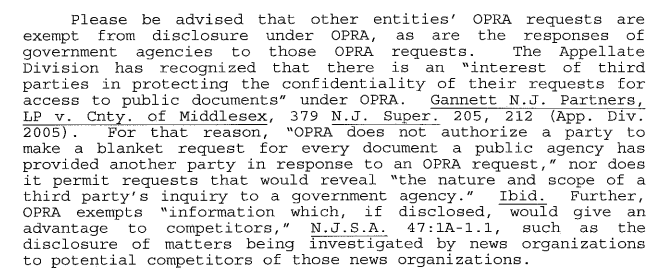New Jersey Governor Chris Christie’s office recently raised eyebrows by rejecting a reporter’s request for its ledger of records requests on the grounds that reporters’ scoops needed to be protected. Now, two additional New Jersey agencies have joined in refusing to release these routine records, each citing verbatim the same dubious case law in their rejection letters.
The log of requests received by a given agency typically includes the date each request was received, the requester’s name, the request itself, and the status of the inquiry. These logs can be incredibly helpful resources. And since they are created and held by a government agency, such logs themselves enter the public record and become subject to records requests — at least, that’s the view of the CIA, the NSA and the DEA, to name a few federal three-letter agencies that released their FOIA logs without dispute in response to MuckRock requests.
The Department of Defense, the Department of the Interior, and the Department of Justice all post their FOIA logs online without even waiting for anyone to request them. While public records laws vary from state to state, the New Jersey Open Public Records Act (OPRA, for fun) enshrines the same basic principles as the federal Freedom of Information Act.
MuckRock submitted identical requests for OPRA logs to the Governor’s office, as well as the Department of Banking and Insurance, the Department of Corrections, and the Department of Environmental Protection.
All the agencies rejected our request except the DEP, which claimed it did not keep any such log.



The three rejections cited Gannett New Jersey Partners, LP v. County of Middlesex, specifically noting that “‘OPRA does not authorize a party to make a blanket request for every document a public agency has provided another party in response to an OPRA request,’ nor does it permit requests that would reveal ‘the nature and scope of a third party’s inquiry to a government agency.’“
MuckRock’s request to these three agencies does not demand every document given by a specific agency, but a log of all requests submitted to each.
But these rejections are even more interesting in light of Governor Christie’s own lawyer’s attempts to use OPRA as a way of deciphering the exact sphere of inquiry made by journalists regarding the “Bridgegate” scandal. According to Talking Points Memo, Christie’s lawyers submitted their own OPRA request for “all documents that Fort Lee Mayor Mark Sokolich or members of his staff provided to the New York Times, Wall Street Journal, or other local or national print, internet, or television media since September 1, 2013 through the Present” that pertain to Governor Christie, his re-election campaign and the “toll/lane realignment” in general.
New Jersey offers two options for challenging the denial of access to a record: The first is to sue the agency in Supreme Court. The second is to file a complaint with the Government Records Council (GRC), a five-member mediating body consisting of three public members appointed by the Governor. MuckRock will be filing formal complaints through the GRC for the FOIA logs in all three cases.
Follow our progress with the New Jersey appeals process: Governor Christie’s office, the Department of Banking and Insurance and the Department of Corrections.
Image via Wikimedia Commons




